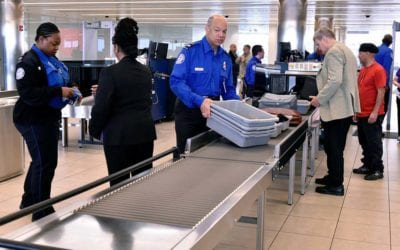Court rules in favor of passengers for TSA excessive searches

A passenger traveled through Washington Dulles International Airport and claimed to be roughed up by a TSA officer/agent while going through TSA security. The TSA agent, when performing an extra security check, “rammed his hand into the genitals of the [passenger], causing the [passenger] to bend over and step away in pain.” At the security checkpoint the passenger was subjected to ridicule and the agent’s coworkers “stonewalled” the passenger.
Plaintiff sued for damages, claiming that the search violated the Fourth Amendment, and the court had to first decide whether such a lawsuit was legally authorized; Congress has expressly authorized (in the 42 U.S.C. § 1983 statute) lawsuits against officials who violate constitutional rights while engaging in state law enforcement, but hasn’t generally done the same as to federal law enforcement.
Most of the rest of this article comes directly from the court documentation, according to the Washington Post. The Plaintiff is the passenger and the Defendant is TSA. Eventually, after claiming “immunity” and noting that this was a “national security” issue, the court disagreed with TSA and stated that the passenger does have rights as well as the TSA agent.
First, does the Fourth Amendment permit a federal officer to gratuitously strike an individual during a search? No. Second, was that clearly established in the law at the time? Yes. …
Taking the allegations of Plaintiff’s Complaint as true, Plaintiff was not suspected of committing any crime, posed no threat to Defendant or others, and fully complied with Defendant’s instructions during the pat-down search. The search in question went well beyond what was necessary to detect contraband, and was not confined to that purpose. There was, in short, no legitimate government interest served by Defendant’s alleged use of force to be weighed against Plaintiff’s substantial interest in being free from an unreasonable seizure. Such an action is “objectively unreasonable,” by any measure, and violates the Fourth Amendment. …
Whether or not the law has established “the specific degree of permissible intrusiveness of a security screening pat-down,” it has clearly established the limits of force that may be used during a Fourth Amendment seizure. It is, and has long been, crystal clear that “officers using unnecessary, gratuitous, and disproportionate force to seize a secured, unarmed citizen, do not act in an objectively reasonable manner and, thus, are not entitled to qualified immunity.” That is precisely what is alleged to have occurred here, and it makes little difference that it occurred in the course of an airport security screening. Frankly, it strains credulity for Defendant to claim that a reasonable federal officer would be surprised to learn that gratuitously striking an individual in the groin while searching them violates the Fourth Amendment.
In sum, Defendant is not entitled to qualified immunity based on the allegations of Plaintiff’s Amended Complaint. The issue, of course, may — and perhaps should — be raised again on a motion for summary judgment, at which point the Court will be able to take into account a wider range of evidence.
The takeaway from this case is that passengers who feel physically abused by TSA during security checkpoint action can find redress through the court systems as the law is written today. Before this ruling, all passengers had virtually no rights at all to protest actions by TSA through the court systems.
Travelers United will be monitoring this issue closely and will report if there are any changes. At the very least, TSA agents are now on notice that they do not have limitless power over passengers. This is a big victory for passengers and hopefully will create a better TSA/passenger interface.

Charlie Leocha is the President of Travelers United. He has been working in Washington, DC, for the past 14 years with Congress, the Department of Transportation, and industry stakeholders on travel issues. He was the first consumer representative to the Advisory Committee for Aviation Consumer Protections appointed by the Secretary of Transportation from 2012 through 2018.



